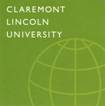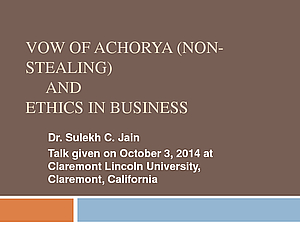
Claremont Lincoln University
3rd International Jain Conference: Business Ethics
What is common between Achorya (non-Stealing) Anuvrat and Business Ethics?
Abstract:
One of the five essential vows in Jainism for monks and householders (called mahavrat for monks and anuvrat for householders) is the lifelong vow of achorya or non-stealing. Many people simply think that this vow pertains to non-stealing and in their views since they don’t steal, they don’t pay much attention to it.
In reality, the vow of achorya means a whole lot more. In simple terms it means not taking any item or services that do not belong to me and also without the full knowledge and willing consent of the giver. It also means that the item or service that is given to me should be in full compliance of the law of the society and also should respect the moral and karmic laws as much as possible. The dealings should be open, fair, transparent and honest. Both the receiver and giver should be able to disclose its full contents to all those who have a need to know. In fact it is an ethical contract of human behavior for dealings, trade, commerce and business in the society.
The landscape of this vow is very vast and broad. Some of the current, modern unethical business and practices that I call outright stealing (not obeying the vow of Achorya) include:
- Not delivering the promised and expected quality (via adulteration in food items, medicines, gasoline, building and construction materials, metals, faulty products & public safety devices etc.) and thus playing with the health and safety of others.
- Willfully cheating and deceiving customers and patients in the delivery of medical treatments and services,
- Not delivering promised or expected quantity (short weighing and measuring),
- Fooling and deceiving customers (via false advertising, using “fine print” to share important information, and deceptive packaging),
- Falsifying account books and promising unreasonable, “sky high” returns to investors (by promising and manipulating impossible returns and inflating stock prices),
- Outright cheating, theft, swindling and embezzlement,
- Hoarding essential need items and profiting by selling them at excessive profits,
- Dealing and trading in items that are derived by himsa to animals and humans,
- Trading and marketing in drugs, narcotics, and other banned items,
- Degrading the environment (polluting water, air, and earth),
- Shipping hazardous wastes to poor countries,
- Deforestation,
- Creating and maintaining unsafe and hazardous work environments,
- Treating workers and employees unfairly and with discrimination in compensation and rewards,
- Smuggling, abetting, aiding, and profiting from unpatriotic and terrorist activities, and
- Offering and accepting bribes to gain unfair advantage and depriving the same benefits to others
While one could write not just one, but many books on of all these topics, in my presentation, I will touch upon only a selected few. All of the included topics have strong footprints of himsa; in fact some of them amount to white-collar crime and colossal himsa.
Presentation:

 Dr. Sulekh Chand Jain
Dr. Sulekh Chand Jain